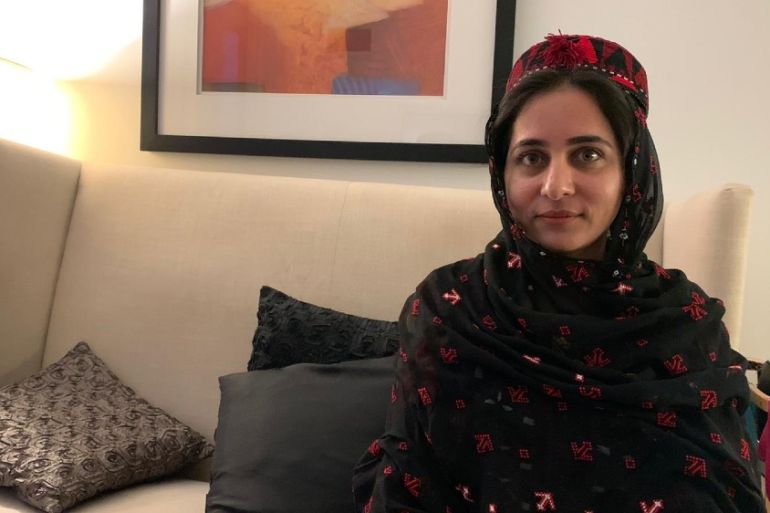Prominent Pakistani rights activist found dead in Toronto
Rights groups call for a full and independent investigation amid a rise in attacks and threats to Pakistani dissidents abroad.

Police say they have found the body of a Pakistani dissident living in the Canadian city of Toronto on refugee status, with rights group Amnesty International and others calling for a full and transparent investigation into the circumstances surrounding her death.
The body of 37-year-old Karima Mehrab Baloch was found on Monday evening, although no immediate cause of death was given by police, said Lateef Johar Baloch, a rights activist.
Keep reading
list of 3 itemsBaloch seek answers from Pakistan as more disappear in conflict
Kashmir and Balochistan: Will Pakistan own up to rights abuses?
“I am with her family [and] I was there when police came to us and confirmed that they found her body,” Lateef Baloch told Al Jazeera by telephone.
“It is confirmed that she is dead, and her body was found from water near Toronto.”
A Toronto police spokesperson confirmed the body of a 37-year-old woman had been located on Monday.
“It is currently being investigated as a non-criminal death and there are not believed to be any suspicious circumstances,” said Caroline de Kloet, a police media relations officer.
Karima had earlier been reported missing by Toronto police, having last been seen at about 3pm local time (20:00 GMT) on Sunday in the Bay Street and Queens Quay West area, according to a police statement.
Rights groups and Pakistani rights activists, particularly those living on asylum status in foreign countries, have called for a thorough investigation into her death, alleging it may have been carried out by state actors.
Karima was a prominent ethnic Baloch rights activist, having led the Baloch Student Organisation’s Azad faction (BSO-A), an organisation at the forefront of the political movement calling for the independence of Pakistan’s ethnic Baloch areas and documenting alleged human rights violations there.
Baloch activists, particularly those calling for independence, have been subject for years to a sustained and documented campaign of enforced disappearances and extrajudicial killings, local and international rights groups say.
Located in Pakistan’s southwest, Balochistan is the country’s largest but least populated province and is rich in minerals and other resources.
Baloch rights groups have long decried what they term Pakistan’s extractive policy towards the region, mining it for resources but leaving it languishing at the bottom of most socioeconomic indicators in the South Asian country.
For more than a decade, armed ethnic Baloch groups have also been fighting a separatist war against Pakistani security forces, killing many Pakistani security forces and civilians in attacks they say are aimed at achieving independence.
Pakistan’s military routinely denies allegations of rights abuses, saying most of the region’s “missing people” are members of armed groups who fled their homes voluntarily.
Karima was one of the most prominent voices calling for justice for political activists who were allegedly abducted or killed by Pakistan’s intelligence services. She took over the leadership of the BSO-A after the disappearance of its previous head, Zahid Baloch, in 2014.
In 2016, the BBC named her as one of its 100 “inspirational and influential women” for that year, citing her activism.
Facing threats to her life, she fled to Canada and was granted permanent political asylum in 2017.
Pattern of violence
“Recently, her husband told me that he got some threats regarding her [in the last week],” said Lateef Baloch, who is not related to Karima but is a close friend and associate.
“People that sent messages to him saying that they will send a ‘gift’ to Karima by Christmas or something like this.”
A screenshot of those threatening messages was shared with Al Jazeera.
On Tuesday, international rights organisation Amnesty International called for a thorough investigation into the rights activist’s death.
“The death of activist Karima Baloch in Toronto, Canada is deeply shocking and must be immediately and effectively investigated,” the group said in a tweet.
“The perpetrators must be brought to justice without recourse to the death penalty.”
Karima’s is the second death of a Pakistani dissident under mysterious circumstances this year.
On March 2, Sajid Hussain, a Pakistani activist and journalist who often wrote on human rights violations in Balochistan and was living in self-imposed exile in Sweden, was reported missing.
His body was found almost two months later in a river near the Swedish town of Uppsala, authorities said.
Police did not investigate Hussain’s death as a crime, but media rights watchdog Reporters Without Borders said there was “a strong possibility that he was killed in connection with his work as a journalist”.
In February, rights activist and critic of Pakistan’s powerful military Ahmed Waqass Goraya was physically attacked outside his home in Rotterdam, where he lives in self-imposed exile.
Pakistani activists living in exile say the deaths and attacks come after a sustained increase in the number of threats they have faced in the last year.
Taha Siddiqui, a prominent Pakistani journalist known for his strident criticism of the military, fled the country in 2018 after he escaped an attempted abduction. He was granted political asylum in France later that year.
Siddiqui told Al Jazeera he had received multiple warnings from the United States and French intelligence agencies since he moved to the French capital Paris regarding threats to his life, and documented at least three incidents of what he deemed to be surveillance of his activities there.
“In Pakistan, we are seeing that there has been a growing oppression and crackdown and suppression of independent voices,” he said.
“Now that they’ve done it at home, it seems they are replicating that model and expanding this model globally.”
Asad Hashim is Al Jazeera’s digital correspondent in Pakistan. He tweets @AsadHashim.